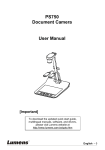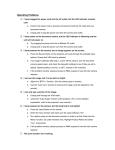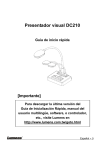Download DC150 Document Camera
Transcript
DC265 Visual Presenter User Manual [Important] To download the latest version of Quick Start Guide, multilingual user manual, software, or driver, etc., please visit Lumens http://www.lumens.com.tw/goto.htm English - 0 Contents Copyright Information ....................................................................................... 3 Chapter 1 Precautions .................................................................................... 4 Safety Precautions ....................................................................................... 5 FCC Warning................................................................................................ 5 EN55022 (CE Radiation) Warning ............................................................... 6 Chapter 2 Package Content ........................................................................... 8 Chapter 3 Product Overview.......................................................................... 9 3.1 Relative position of the presenter and DC265 .................................. 10 3.2 Recommend distance ........................................................................ 10 3.3 Incorrect use ...................................................................................... 11 Chapter 4 Installation and Connections ..................................................... 12 4.1 System diagram................................................................................. 12 4.2 Mounting the DC265 at desktop ........................................................ 13 4.3 Connecting devices ........................................................................... 13 4.4 Start using the DC265 ....................................................................... 16 4.5 Installing remote control holder ......................................................... 16 4.6 Installing application software ........................................................... 17 Chapter 5 DIP Switch Settings .................................................................... 18 5.1 Connecting to a projector or monitor ................................................. 18 5.2 Connecting to a TV ............................................................................ 19 Chapter 6 Control Panel/Remote Control and Setting Menu ................... 20 6.1 Functions of control panel and remote control .................................. 20 6.2 Setting Menu ..................................................................................... 22 Chapter 7 Descriptions of major functions .................................................... 27 English - 1 7.1 I would like to switch image sources ................................................. 27 7.2 I would like to make text clearer and photos more colorful ............... 27 7.3 I would like to zoom in /out of images ............................................... 27 7.4 I would like to use the auto focus ...................................................... 27 7.5 I would like to adjust the brightness .................................................. 28 7.6 I would like to turn on/ off the lamp.................................................... 28 7.7 I would like to automatically adjust the image to have best brightness and focusing performance ................................................................. 28 7.8 I would like to capture images ........................................................... 28 7.9 I would like to view captured images ................................................. 29 7.10 I would like to delete captured images .............................................. 29 7.11 I would like to automatically delete the captured images whenever it is turned off (Auto Erase) ...................................................................... 29 7.12 I would like to record videos (Record) ............................................... 30 7.13 I would like to switch a part of the live image (PAN) ......................... 30 7.14 I would like to play the slides (Slide Show) ....................................... 31 7.15 I would like to compare images (Compare live images with captured images) (PBP, Picture by Picture) ..................................................... 31 7.16 I would like to resume the factory default setting (Factory Reset) .... 32 7.17 I would like to reduce the image noise (Projector Type) ................... 33 7.18 I would like to set / change the password (Lock Down) .................... 33 7.19 Using a SD card ................................................................................ 34 7.20 Computer-related functions ............................................................... 35 Chapter 8 Connecting to Microscope ......................................................... 42 Chapter 9 Troubleshooting .......................................................................... 44 English - 2 Copyright Information Copyrights © Lumens Digital Optics Inc. All rights reserved. Lumens is a trademark that is currently being registered by Lumens Digital Optics Inc. Copying, reproducing or transmitting this file is not allowed if a license is not provided by Lumens Digital Optics Inc. unless copying this file is for the purpose of backup after purchasing this product. In order to keep improving the product, Lumens Digital Optics Inc. hereby reserves the right to make changes to product specifications without prior notice. The information in this file is subject to change without prior notice. To fully explain or describe how this product should be used, this manual may refer to names of other products or companies, nevertheless without any intention of infringement. Disclaimer of warranties: Lumens Digital Optics Inc. is neither responsible for any possible technological, editorial errors or omissions, nor responsible for any incidental or related damages arising from providing this file, using, or operating this product. English - 3 Chapter 1 Precautions Always follow these safety instructions when setting up and using the visual presenter: 1. Do not place visual presenter in tilted position. 2. Do not place the visual presenter on an unstable trolley, stand or table. 3. Do not use the visual presenter near water or source of heat. 4. Use attachments only as recommended. 5. Use the type of power source indicated on the visual presenter. If you are not sure of the type of power available, consult your dealer or local electricity company for advice 6. Place the visual presenter on a place that it can be unplugged easily. 7. Always take the following precautions when handling the plug. Failure to do so may result in sparks or fire. Ensure the plug is free of dust before inserting it into a socket. Ensure that the plug is inserted into the socket securely. 8. Do not overload wall sockets, extensions leads or multi-way plug boards as this may cause fire or electric shock. 9. Do not place the visual presenter where the cord can be stepped on as this may result in fraying or damage to the lead or the plug. 10. Unplug the projector from the wall socket before cleaning. Use a damp cloth for cleaning. Do not use liquid or aerosol cleaners. 11. Do not block the slots and openings in the projector case. They provide ventilation and prevent the visual presenter from overheating. Do not place the visual presenter on a sofa, rug or other soft surface or in a built-in installation unless proper ventilation is provided. 12. Never push objects of any kind through cabinet slots. Never allow liquid of any kind to spill into the visual presenter. 13. Except as specifically instructed in this User Manual, do not attempt to operate this product by yourself. Opening or removing covers may expose you to dangerous voltages and other hazards. Refer all servicing to licensed service personnel. 14. Unplug the visual presenter during thunderstorms or if it is not going to be used for an extended period, do not place the visual presenter or remote control on top of heat-emitting equipment or heated objects such as a car and etc. English - 4 15. Unplug the visual presenter from the wall outlet and refer serving to licensed service personnel when the following situations happen: If the power cable or plug becomes damaged or frayed. If liquid is spilled into it or the visual presenter has been exposed to rain or water. <Note> Using an incorrect battery type in the remote control may result in breakdown. Follow your country’s instructions on how to dispose of used batteries. Safety Precautions Warning: To reduce the risk of fire or electric shock, do not expose this appliance to rain or moisture. This visual presenter has a 3-wire AC line Plug. This is a safety feature to ensure that the plug will fit into the power outlet. Do not try to disable this safety feature. If the visual presenter will not be used for a long period of time unplug it from the power outlet. CAUTION RISK OF ELECTRIC SHOCK Caution: To reduce the risk of electric shock. Do not remove cover (or back). No user-serviceable parts inside. Refer servicing to licensed service Personnel. This symbol indicates that this equipment may contain dangerous voltage which could cause electric shock. This symbol indicates that there are important operating and maintenance instructions in this User’s Manual with this unit. FCC Warning NOTE: THE MANUFACTURER IS NOT RESPONSIBLE FOR ANY RADIO OR TV INTERFERENCE CAUSED BY UNAUTHORIZED MODIFICATIONS TO THIS EQUIPMENT. SUCH MODIFICATIONS COULD VOID THE USER'S AUTHORITY TO OPERATE THE EQUIPMENT. English - 5 Note: This equipment has been tested and found to comply with the limits for a Class A or B digital device, pursuant to Part 15 of FCC Rules. These limits are designed to provide reasonable protection against harmful interference in a residential installation. This equipment generates uses and can radiate radio frequency energy and, if not installed and used in accordance with the instruction, may cause harmful interference to radio communications. However, there is no guarantee that interference will not occur in a particular installation. If this equipment does cause harmful interference to radio or television reception, which can be determined by turning the equipment off and on, the user is encouraged to try to correct the interference by one or more of the following measures: • • • Reorient or relocate the receiving antenna. Increase the separation between the equipment and receiver. Connect the equipment into an outlet on a circuit different from that to which the receiver is connected. • Consult the dealer or an experienced radio/TV technician for help. Notice: (1) A Unshielded-type power cord is required in order to meet FCC emission limits and also to prevent interference to the nearby radio and television reception. It is essential that only the supplied power cords by used. (2) Use only shielded cables to connect I/O devices to this equipment. (3) Changes or modifications not expressly approved by the party responsible for compliance could void the user’s authority to operate the equipment. EN55022 (CE Radiation) Warning This product is intended for use in a commercial, industrial, or educational environment. It is not intended for residential use. This is a Class A product. In a domestic environment it may cause radio interference, in which case the user may be required to take adequate measures. The typical use is in a conference room, meeting room or auditorium. English - 6 Revision Note English - 7 Chapter 2 Package Content DC265 Quick Start Guide Remote Control Holder Remote control Audio cable Extender Adapter VGA Cable USB Cable C-Video Cable Power Cord Microscope Adapter Base Installation Guide & Download Card Appearance may vary with country/region. Software Bag Padded Carry Bag (Optional) English - 8 Chapter 3 Product Overview 8. Gooseneck 7. AF button 4. LED indicator 1. Lamp 3. Control panel 2. Remote sensor 9. Built-in Microphone 5. Lens 6. DIP switch (Bottom) English - 9 3.1 Relative position of the presenter and DC265 DC265 Document Presenter 3.2 Recommend distance * About 470 mm distance between camera and the desktop is recommended. English - 10 3.3 Incorrect use English - 11 Chapter 4 Installation and Connections 4.1 System diagram PC Projector Monitor Monitor 机 PC Speaker (or an amplifier before connecting to the speaker) LCD TV SD Card PC Television English - 12 4.2 Mounting the DC265 at desktop 1. Please set up the DIP Switch settings first. Refer to Chapter 5 “DIP Switch Settings” in the DC265 user manual. 2. Please refer to the Base Installation Guide for installation instructions for all parts. 4.3 Connecting devices 4.3.1 Step 1: Plugging in the power outlet AC Outlet <Note> Appearance of power cord may vary with countries/regions. 4.3.2 Step 2: Connecting with components Connecting to a projector Connect the VGA OUT on the DC265 to the VGA IN on the projector using the VGA cable. Connecting to a monitor Use VGA cable to connect VGA PASSTHROUGH connector on DC265 to the VGA IN connector on a monitor. [Note] The VGA PASSTHROUGH connector only outputs VGA IN signals. English - 13 Connecting to a TV 1. Using EXTENDER adapter and C-Video cable to connect EXTENDER of DC265 to a C-Video of TV. 2. Adjust DIP Switch Setting NTSC: America, Taiwan, Panama, Philippine, Canada, Chile, Japan, Korea and Mexico PAL: Country/region not listed above: <Note> OSD is not available in C-Video. Functions such as [Menu] / [Rotate] / [PAN] / [Source] / [Record] / [Capture] / [Delete] / [PBP] / [Slide Show] are not available on control panel and the remote control. <Note> VGA output is not supported once C-Video output is enabled. 3. DIP Switch setting will not be available until restarting the DC265 Connecting to a LCD TV/ PDP Using the HDMI cable to connect a LCD TV/ PDP English - 14 Connecting to a computer Use VGA cable to connect VGA IN connector on DC265 to the VGA OUT connector on the computer Using the USB Cable Connect to USB port then install the supplied Ladibug™ program. Please refer to the DC265 User Manual. Using the EXTENDER adapter and RS232 Cable to connect EXTENDER of DC265 to a RS232 of computer Connecting to speaker Speaker <Remark>: Or connect to an additional amplifier before connecting to the speaker. English - 15 4.4 Start using the DC265 Control Panel Remote Control When using the remote control, aim at the receptor on the DC265, and press the power button. Once DC265 is turned on, the LED on the control panel will flash a few times and stay lit. Please contact your distributor if the LED is not on. <Note> Once the password page is shown , please key in the password. If you forget it, please contact your distributor or the service center. 4.5 Installing remote control holder Insert the holder over the gooseneck of the camera and push it down. English - 16 4.6 Installing application software After installing the USB driver and application software, you can use the following functions: Control the DC265. Capture and record images. Annotate the image, highlight important details and save it. Support the full screen function. <Note>: Please refer to Ladibug™ software user manual for installation steps and software operation. English - 17 Chapter 5 DIP Switch Settings <Note> You have to reset the unit for setting to take affect. 5.1 Connecting to a projector or monitor 5.1.1 SXGA 60Hz output (default values): 5.1.2 XGA 60 Hz output 5.1.3 Special mode 5.1.4 HDTV 720P 60Hz output English - 18 5.2 Connecting to a TV 5.2.1 NTSC: America, Taiwan, Panama, Philippines, Canada, Chile, Japan, Korea and Mexico 5.2.2 PAL: Countries/regions not listed above. <Remark> VGA output is not supported once C-Video output has been enabled. English - 19 Chapter 6 Control Panel/Remote Control and Setting Menu 6.1 Functions of control panel and remote control <NOTE>: OSD is not available at C-Video mode. [Menu] / [Rotate] / [PAN] / [Source] / [Record] / [Capture] / [Delete] / [PBP] / [Slide Show] functions are not available on the machine panel and the remote control. <Remark> The below functions are listed alphabetically. Name Function Turn on and off the visual presenter. Operation Remote control / Control panel AF Move up, down, left or right to select the needed function. Automatically adjust focal length on an object. Remote control / Control panel Remote control / Camera Head Auto Tune BRT+/- Automatically adjust the image to have the best brightness and focusing performance. Manually adjust the brightness of the image. Control panel Remote control / Control panel Capture Delete Enter Capture the image to the SD card (priority) or internal memory. Delete the image stored in the SD card (priority) or internal memory. Enter/Activate functions. Remote control / Control panel Control panel Remote control / Control panel Freeze Lamp Menu Freeze the current image to temporarily stay on the screen. Press again to defreeze. Turn on / off the lamp. Activate the setting menu function/exit menu. Remote control / Control panel Control panel Remote control / Control panel PAN Switch a part of the live image Remote control / Control panel English - 20 PBP Compare live images with captured images. Remote control Record Record motion images. Press [Record] to record images to SD card, press [Record] again to stop Remote control / Rotate recording. Rotate the image by 0°/90°/180°/270°. Control panel Remote control / Control panel Slide Show Source Zoom +/- Show the photos or videos stored in the SD card (priority) or internal memory in slide mode. Switch between different sources of signals: 1. Live images (default) 2. SD card (priority) or internal memory 3. Computer Increase or decrease the image size. Remote control Remote control / Control panel Remote control / Control panel English - 21 6.2 Setting Menu <Remark> Press [Menu] on the remote control or control panel to enter the setting menu; The bold underlined values in the following table are the defaults. st rd 1 Level 3 Level nd 2 Level Descriptions Major Adjustment Minor Items Items values Focus 0~Max Use the left and right arrow keys to adjust focal length on an object Mode Normal/Slide/ Film/Microscope Use the left and right arrow keys to select the image mode. Photo/Text Photo/Text/Gray Use the left and right arrow keys to select the image mode. PBP Enter Press [Enter] to immediately activate photo comparison mode. Night Vision On/Off Use the left and right arrow keys to select. The night vision mode suits with darker environment. Digital Zoom On/Off Use the left and right arrow keys to turn digital zoom on/off. Enter Press [Enter] to play the photos or videos stored in the SD card (priority) or internal memory. Display Slide Show Storage Slide Show Effect 1. Off 2. Shutter 3. Right 4. Down 5. Side 6. Open Use the left and right arrow keys to select the image switch mode. English - 22 1. 0.5 Sec 2. 1 Sec Delay 3. 3 Sec 4. 5 Sec 5. 10 Sec Use the left and right arrow keys to select the delay time. Select manual mode to switch images manually. 6. Manual 1. High Image Quality 2. Medium 3. Low Copy To SD Delete All Enter Yes/No Use the left and right arrow keys to select the image quality for the captured images and recorded videos. Press [Enter] to immediately copy the data in visual presenter to the SD card. Use the left and right arrow keys to select, and then press [Enter] to confirm the deletion of photos. Delete the image stored in the SD card (priority) or internal memory. Format Yes/No Capture 1. Single 2. Continuous 3. Disable Capture Time 1. 1 hr 2. 2 hr 3. 4 hr 4. 8 hr 5. 24 hr Setting Use the left and right arrow keys to select, and then press [Enter] to format the data stored in the SD card (priority) or internal memory. Use the left and right arrow keys to select the video capture mode. (Single/Continuous/Disable) Use the left and right arrow keys to set the capture time. <Note> It only works when the capture mode is set to [continuous]. English - 23 Capture Interval 1. 5 sec 2. 10 sec 3. 30 sec 4. 1 min 5. 2 min 6. 5 min Use the left and right arrow keys to set the capture interval. <Note> It only works when the capture mode is set to [continuous]. Use the left and right arrow keys to select the USB transfer mode. USB Transfer AE 1. Camera 2. Storage device On/Off 1.Camera: connecting the DC265 to view live image; 2.Storage device: connecting to the SD card (priority) or internal memory. Regardless of outside environment, the machine will adjust the brightness to the optimal condition. Use the left and right arrow keys to select. Enter Regardless of outside light or color, the machine will adjust the color to the optimal condition. Press [Enter] to activate. Projector Type DLP/LCD Use the left and right arrow keys to turn on/off the noise reduction function. Volume 0~Max Use the left and right arrow keys to adjust the volume. AWB English - 24 Language 1. English English 2. 繁体中文 Traditional Chinese 3. Deutsch German 4. Français French 5. Español Spanish 6. Русский Russian 7. Nederlands Dutch 8. Suomi 9. Polski Finnish 10. Italiano Italian 11. Português Portuguese 12. Svenska Swedish 13. Česky Czech Polish Use the left and right arrow keys in the language option to select the preferred language. Advanced 1. XGA 2. SXGA Output Mode 3. UXGA 4. 720P 5. 1080P Lock Down Auto Erase Based on different DIP switch settings, different output modes are provided. Refer to Chapter 5 DIP “Switch Settings” in the DC265 user manual. On/Off Use the left and right arrow keys to turn the lock down function on and off. You can set the password when [On] is selected. On/Off Use the left and right arrow keys to turn the auto erase function on and off. When [On] is selected, the saved images will automatically be deleted when the system is turned off. English - 25 Read the value of the current image mode. Preset Load Yes/No Use the left and right arrow keys to select, and then press [Enter] to confirm. Save the value of the current image mode. Preset Save Factory Reset Yes/No Yes/No Use the left and right arrow keys to select, and then press [Enter] to confirm. Use the left and right arrow keys to select, and then immediately press [Enter] to activate the factory reset. English - 26 Chapter 7 Descriptions of major functions 7.1 I would like to switch image sources Live image is the default of image source. Press [Source] on the remote control or control panel to change: 1. Live images (default) 2. SD card (priority) or internal memory 3. Computer. 7.2 I would like to make text clearer and photos more colorful Photo is the default. You can change setting via the remote control or control panel. [Photo](default): for viewing photos or text with photos and will make the photos more colorful. [Text]: for viewing text files and will make the text clearer. [Gray]: for viewing black and white photos and will make the grayscale differentiation more distinct. If you use the remote control or the control panel: 1. Press [MENU] to enter the setting menu. 2. Press [] or [] to select [Display]. 3. Press [] to select [Photo/Text]. 4. Press [] or [] to select [Photo/Text/Gray] (Refer to the description above). 5. Press [MENU] to exit. 7.3 I would like to zoom in /out of images 1. Press [Zoom +] on the remote control or control panel to zoom in. 2. Press [Zoom -] on the remote control or control panel to zoom out. 7.4 I would like to use the auto focus 1. Press [AF] on the remote control. English - 27 2. Press the AF button on the camera head of main unit. 7.5 I would like to adjust the brightness If you use the remote control or the control panel: 1. Press [BRT +] to make it brighter. 2. Press [BRT -] to make it darker. 7.6 I would like to turn on/ off the lamp 1. The default of lamp is turn on. Press [Lamp] on the control panel to turn off. 7.7 I would like to automatically adjust the image to have best brightness and focusing performance 1. Press [Auto Tune] on the control panel. 7.8 I would like to capture images 7.8.1 Setting the quality of captured images 1. Press [Menu] on the remote control or control panel to enter the setting menu. 2. Press [] or [] to the [Storage]. 3. Press [] to find [Image Quality]. 4. Press [] or [] to select among [High/Medium/Low]. 5. Press [Menu] to exit. 7.8.2 Setting continuous capture 1. Press [Menu] on the remote control or control panel to enter the setting menu 2. Press [] or [] to the [Setting] menu. 3. Press [] to find [Capture]. 4. Press [] or [] to select [continuous]. 5. Press [] to find [Capture Time]. Press [] or [] to select time settings. 6. Press [] to find [Capture Interval]. Press [] or [] to select time settings. 7. Press [Menu] to exit. English - 28 7.8.3 Capturing and saving images 1. Press [Capture] on the remote control or control panel . <Note> If the capture mode is set to [continuous], press [Capture] to capture images continuously, press [Capture] again to exit. 7.9 I would like to view captured images 1. Press [Source] on the remote control or control panel to display thumbnails of all captured images. 2. Press [] or [] or [] or [] to select the thumbnail you want you view. 3. Press [Enter] for the full-screen display of the image. 4. Press [] or [] to turn to the previous/next image. 5. Press [Source] to exit. 7.10 I would like to delete captured images 1. Press [Source] on the control panel. 2. Press [] or [] or [] or [] to select the thumbnail you want you delete. 3. Pressing [Delete] will open a [Delete File] window. 4. Press [] or [] to select [Yes] (The default value is No). 5. Press [Enter] to delete the selected photo. 6. Press [Source] to exit. 7.11 I would like to automatically delete the captured images whenever it is turned off (Auto Erase) 1. Press [Menu] on the remote control or control panel to enter the setting menu. 2. Press [] or [] to access the [Advanced] menu. 3. Press [] or [] to [Auto Erase]. 4. Press [] to select [On]. 5. Press [Menu] to exit. 6. It will automatically delete all captured photos when it is turned off. English - 29 7.12 I would like to record videos (Record) 7.12.1 Setting the image quality 1. Press [Menu] on the remote control or control panel to enter the setting menu. 2. Press [] or [] to the [Storage]. 3. Press [] to [Image Quality]. 4. Press [] or [] to select among [High/Medium/Low]. 5. Press [Menu] to exit. 7.12.2 Recording motion images 1. Press [Record] on the remote control or control panel to start recording videos. 2. Press [Record] again to stop recording. 3. Record sounds with the built-in microphone of the control panel. 7.12.3 Playing videos 1. Press [Source] on the remote control or control panel to display thumbnails of all video recorded. 2. Press [] or [] or [] or [] to select the thumbnail you want you view. 3. Press [Enter] for full-screen play. 4. Press [] or [] to turn to the previous/next video. 5. Press [Source] to exit. [Note] Only the MOV files recorded can be played and live sound output is not available; additional amplifier can be connected to the PHONE port. 7.13 I would like to switch a part of the live image (PAN) If you use the remote control or the control panel: 1. Press [PAN] to enter the image pan mode 2. Press [] or [] or [] or [] to move and view the partial enlarged images. 3. Press [PAN] to exit the partial enlarged mode. English - 30 7.14 I would like to play the slides (Slide Show) 7.14.1 Setting the slide show effect 1. Press [Menu] on the remote control or control panel to enter the setting menu. 2. Press [] or [] to access the [Storage] menu. 3. Press [] to find the [Slide Show Effect]. 4. Press [] or [] to select image switch mode between [Off / Shutter / Right / Down / Side / Open]. 5. Press [Menu] to exit. 7.14.2 Setting delay time 1. Press [Menu] on the remote control or control panel to enter the setting menu. 2. Press [] or [] to access the [Storage] menu. 3. Press [] to find the [Delay]. 4. Press [] or [] to select image switch mode between [0.5 Sec / 1 Sec / 3 Sec / 5 Sec / 10 Sec / Manual]. 5. Press [Menu] to exit. 7.14.3 Activating/Stopping the slide show <Notes>Images over 8 MB, cannot be played. Whilst playing, the [Rotate] function can be activated to rotate the images. Remote control: 1. Press [Slide Show] to start playing. 2. Press [Slide Show] again to stop playing. Control panel: 1. Press [Menu] to enter the setting menu. 2. Press [] or [] to access the [Storage] menu. 3. Press [] to find [Slide Show] 4. Press [Enter] to play. 5. To stop playing, repeat steps 1 to 4. 7.15 I would like to compare images (Compare live images with captured images) (PBP, Picture by Picture) This function will compare and contrast a live image with a captured image. English - 31 C1 C2 C3 C4 C5 C6 C7 Captured Image Live Image Remote control: 1. Press [PBP] to enter the PBP (Picture by Picture) photo selection screen. 2. Press [] or [] or [] or [] to select the files to be compared. 3. Press [Enter] to activate the image comparison. 4. Press [] or [] to move the images (captured images only) leftward/rightward. 5. Press [Menu] again to return to image thumbnails. 6. Press [Source] to exit. Control panel: 1. Press [Menu] to enter the setting menu. 2. Press [] or [] to access the [Display] menu. 3. Press [] to find [PBP] 4. Press [Enter] to enter the PBP (Picture by Picture) photo selection screen. 5. Press [] or [] or [] or [] to select the files to be compared. 6. Press [Enter] to activate the image comparison. 7. Press [] or [] to move the images (captured images only) leftward/rightward. 8. Press [Menu] again to return to image thumbnails. 9. Press [Source] to exit. 7.16 I would like to resume the factory default setting (Factory Reset) 1. Press[Menu]on the remote control or control panel to enter the setting menu English - 32 2. 3. 4. 5. Press [] or [] to access the [Advanced] menu. Press [] to select [Factory Reset]. Press [] or [] to select [Yes]. Press [Enter] to activate. 7.17 I would like to reduce the image noise (Projector Type) This function enables visual presenter to automatically clear image noise. The noise is especially obvious when Visual presenter is connected to a DLP projector. You can use this function to improve the image quality. 1. Press [Menu] on the remote control or control panel to enter the setting menu. 2. Press [] or [] to the [Setting]. 3. Press [] to [Projector Type]. 4. Press [] or [] to select [DLP/LCD]. 5. Press [Menu] to exit. 7.18 I would like to set / change the password (Lock Down) 7.18.1 Setting the password 1. 2. 3. 4. 5. Press [Menu] on the control panel to enter the setting menu. Press [] or [] to the [Advanced] menu. Press [] to [Lock Down]. Press [] or [] to select [On]. The screen will be displayed, as shown below. Key in Password ** English - 33 6. Key in the password Press the keys on the control panel. All keys can be used as part of the password except the [Power] and [Enter] keys. The maximum number of characters is 2. For example, you can press [Source] + [Menu] as the password. <Remark>The screen will show * while you enter the password. Ensure that you remember the order in which the keys are entered. 7. After completing the password, press [Enter]. 8. The confirmation screen will be displayed, as shown below. Enter the password again. Confirm password 9. After you enter the password, press [Enter]. If the password is entered correctly, setup is completed. If the password is incorrect, an error message is displayed and please follows the screen instructions. 7.18.2 Changing the password 1. 2. 3. 4. Press [Menu] on the control panel to enter the setting menu. Press [] or [] to the [Advanced] menu. Press [] to [Lock Down] Press [] or [] to select [Off] and deactivate the password setting function. 5. Press [] or [] to select [On] and reactivate the password setting function. Refer to Steps 5-8 in DC265 User Manual Chapter 7 Descriptions of major functions 7.18.1 Setting the password for operational steps. 7.19 Using a SD card 7.19.1 Deactivate the write protect function (SD Lock) If the write protect function of the SD card is activated, you will not be able to use the Capture function, although you can still read the files in it. English - 34 Adjust the Lock of the SD card to deactivate the write protect function. 7.19.2 Inserting a SD card 7.19.2.1 The screen will display [Copy to SD card] and ask if you would like to copy the files saved in the DC265 to a SD card. Press [] or [] on the control panel to select. Copy to SD Card YES NO 7.19.2.2 The screen will display as follow, once you insert an unformatted SD card. Press [] or [] on the control panel to select. Format SD Card YES NO <Note> The data previously saved on the SD card will be erased when it is formatting. 7.19.3 Ejecting a SD card <Note> Turn the power off before ejecting the SD card to avoid damaging the SD card. 7.20 Computer-related functions Ensure that the USB cable is connected and the drivers are installed before using the computer-related functions. Refer to DC265 User Manual Chapter 4 Installation and Connections 4.3 Connecting Devices and 4.6 Installing application software. English - 35 7.20.1 I would like to insert a photo in MS-Paint 1. Click File> From Scanner or Camera in MS-Paint shown as the bottom left figure. 2. Click [Get Picture] will capture the photos of live images and insert the files in use shown as top right figure. 7.20.2 I would like to insert a photo in MS-Word <Remark>: For Windows Office 2003 or later versions, please use the function with OneNote. 1. Click Insert > Image > From Scanner or Camera in MS-Word. 2. Select [Visual Presenter V2] and click [Custom Insert]. English - 36 3. Click [Get Picture]. It will capture the photo of live image. 7.20.3 I would like to change the setting of DC265 then capture a photo in MS-Word <Remark>: For Windows Office 2003 or later versions, please use the function with OneNote. 1. Click Insert > Image > From Scanner or Camera in MS-Word. 2. Select [Visual Presenter V2 TWAIN] and click [Custom Insert]. English - 37 3. A window showing a live image (see below) will be displayed. 4. Press [Setting] to control the DC265 via the Camera Settings interface. The operating procedure is the same with the remote control and control panel of the DC265. Refer to DC265 User Manual Chapter 6 Control Panel / Remote Control and Setting Menu. 5. Press [Setting] to capture images in MS-Word. 6. Press [Cancel] to exit. 7.20.4 I would like to set the DC265 as a webcam for Skype The DC265 can be used as a webcam for teleconferencing software such as Skype and MSN. The following instructions use Skype as an example. English - 38 1. Open Skype and enter Tools > Options…. 2. Select [Video Settings] > [webcam] > [Visual Presenter V2] and check Start my video automatically when I am in a call, as shown below. 3. Start calling your contact. When both sides are connected, Skype will display the video screen. 7.20.5 I would like to set the DC265 as a PC Camera 1. Press [Menu] on the remote control or control panel to enter the setting menu. 2. Press [] or [] to the [Setting] menu. English - 39 3. Press [] to find [USB Transfer]. 4. Press [] or [] to select [Camera]. 5. A window will be displayed, showing the [Visual Presenter V2], as shown below 6. Click the [Visual Presenter V2]. 7.20.6 I would like to set the DC265 as a Removable Disc 1. Press [Menu] on the remote control or control panel to enter the setting menu. 2. Press [] or [] to the [Setting] menu. 3. Press [] to find [USB Transfer]. 4. Press [] or [] to select [Storage device]. 5. Press [Menu] to exit. 6. A Removable Disc will be displayed. <Remark> The Removable Disc will select SD card if a SD card has been inserted, but if a SD card has not been inserted, the Removable Disc is internal memory. English - 40 <Note> Doing this will disable the Capture function. Suggest you return it to [Camera] mode after using this function. Please follow the steps below. 1. Press [Menu] on the remote control or control panel to enter the setting menu. 2. Press [] or [] to the [Setting] menu. 3. Press [] to find [USB Transfer]. 4. Press [] or [] to select [Camera]. 5. Press [Menu] to exit. 7.20.7 I would like to connect Interactive Whiteboard To connect an Interactive Whiteboard, please go to the SD card or Lumens website (http://www.lumens.com.tw/goto.htm) to download user manual for a specific brand. English - 41 Chapter 8 Connecting to Microscope 1. Mount the microscope adaptor onto the microscope. <Note> Please choose an appropriate microscope adapter. Microscope adapter accessories are applicable to eyepieces of Ø 28mm, Ø 31mm, Ø 33mm, and Ø 34mm. 2. The lens of DC265 connects with the microscope adaptor. If the eyepiece is Ø 33mm or Ø 34mm, only one Lumens microscope adapter is needed. If the eyepiece is Ø 28mm or Ø 31mm, you need two microscope adapters. (1. The Lumens microscope adapter. 2. The microscope adapter suitable for the eyepiece size Ø 28mm or Ø 31mm.) 3. Select the [Microscope] Mode 3.1. If you use the remote control or the control panel 3.1.1. Press [MENU] to enter the setting menu. 3.1.2. Press [] or [] to select [Display]. 3.1.3. Press [] to select [Mode]. 3.1.4. Press [] or [] to select [Microscope]. 4. If the image is not clear. 4.1. Please adjust the focus of microscope. 4.2. Press the AF button on the camera head of main unit to activate the auto focus. English - 42 5. Digital Zoom 5.1. Press [MENU] to enter the setting menu. 5.2. Press [] or [] to the [Setting]. 5.3. Press [] to select [Digital Zoom]. 5.4. Press [] or [] to select [On]. 5.5. Press [Zoom +]/[Zoom -] on the remote control and control panel <Note> In microscope mode all functions are available except for the [Zoom +] / [Zoom -] / [PAN] functions on the remote control and control panel. Please reset to normal mode after using the microscope, otherwise, you are unable to use zoom in/out function. 1. Press [MENU] on the remote control or control panel to enter the setting menu. 2. Press [] or [] to select [Display]. 3. Press [] to select [Mode]. 4. Press [] or [] to select [Normal]. English - 43 Chapter 9 Troubleshooting This chapter describes problems you may encounter while using DC265. If you have questions, please refer to related chapters and follow all the suggested solutions. If the problem still occurred, please contact our distributors or service center. No. 1 2 Issues Boot without power No image output from the DC265 3 Unable to focus 4 The image is incomplete 5 Forget the password for turning on Visual Presenter V1, Ladibug™ or other application cannot be executed simultaneously 6 Solutions Make sure you have plugged in the power cord. 1. Check the power. 2. Check the connection, Refer to DC265 User Manual Chapter 4 Installation and Connections 4.3 Connecting Devices 3. Check the [Source], refer to DC265 User Manual Chapter 7 Descriptions of major functions 7.1 I would like to switch image sources 4. Check the settings for the source of the projector. For the appropriate input selection of the projector, refer to the projectors user manual 5. Check if DIP Switch is properly set. Refer to DC265 User Manual Chapter 5 DIP Switch Settings for related settings. Probably the document is too close. Press [zoom -] on the remote control or control panel. Or pull away the distance between document and lens, then press [AF]. Check the Auto Image setting of your projector. Please refer to the user manual of the projector. Please contact your distributor or the service center. Visual Presenter V1, Ladibug™ and other applications cannot be executed simultaneously. Only one application can be executed at a time. Please close the currently running applications and then execute the application to be used. English - 44













































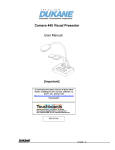

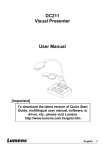
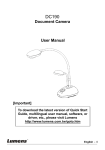
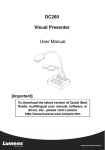
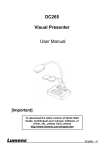
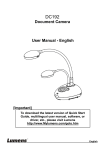
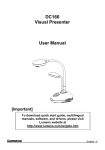
![Document Camera User Manual - English [Important]](http://vs1.manualzilla.com/store/data/005869740_1-d5afbdd6fe5957e2a87c5d7dc0d0d3c3-150x150.png)
